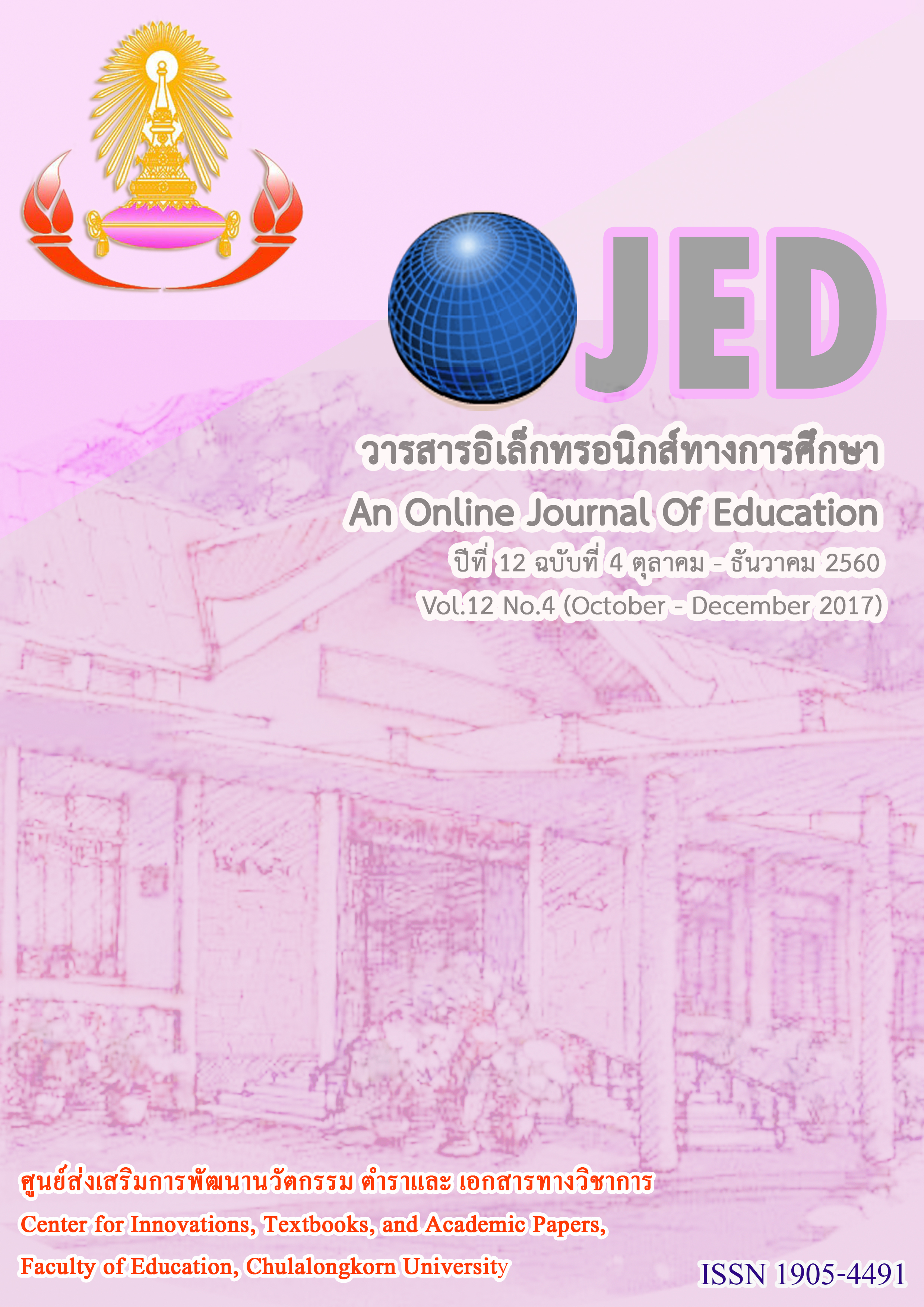ผลของการสอนแบบเน้นงานปฏิบัติผ่านเกมออนไลน์ที่มีต่อความเต็มใจในการสื่อสารเป็นภาษาอังกฤษ ของนิสิต นักศึกษา ระดับปริญญาตรีในกรุงเทพมหานคร
Keywords:
การสอนแบบเน้นงานปฏิบัติ, เกมออนไลน์, ความเต็มใจในการสื่อสาร, TASK-BASED INSTRUCTION, ONLINE GAMES, WILLINGNESS TO COMMUNICATEAbstract
งานวิจัยนี้มีวัตถุประสงค์ เพื่อศึกษาระดับของความเต็มใจในการสื่อสารเป็นภาษาอังกฤษของนิสิต นักศึกษา ระดับปริญญาตรี ในกรุงเทพมหานคร หลังจากที่ได้รับการสอนแบบเน้นงานปฏิบัติผ่านเกมออนไลน์จำนวนเจ็ดครั้ง กลุ่มตัวอย่างของงานวิจัยชิ้นนี้ประกอบด้วยนิสิตชั้นปีที่ 1 จำนวน 15 คน จากมหาวิทยาลัยรัฐบาลแห่งหนึ่งในกรุงเทพฯ ในภาคการศึกษาตอนปลาย ปีการศึกษา 2557 เครื่องมือที่ใช้ในการวิจัย ได้แก่ แบบสอบถามความเต็มใจในการสื่อสารเป็นภาษาอังกฤษ จำนวน 2 ชุด โดยใช้สถิติเชิงบรรยายในการวิเคราะห์ข้อมูล
ผลการวิจัยพบว่า ความเต็มใจในการสื่อสารเป็นภาษาอังกฤษโดยรวมที่รับรู้โดยกลุ่มตัวอย่างในเกมออนไลน์ (M = 2.89, S.D. = 0.18) มีระดับสูงกว่าในชั้นเรียน (M = 2.78, S.D. = 0.22) เมื่อเปรียบเทียบระหว่างบริบทออนไลน์เกมและบริบทชั้นเรียน กลุ่มตัวอย่างระบุว่ามีความประสงค์ต่ำกว่าที่จะสื่อสารกับบุคคลใดโดยเฉพาะเจาะจง โดยเฉพาะอย่างยิ่งกับผู้ที่มีตัวละครที่น่าดึงดูดทางกายภาพ (M = 2.27, S.D. = 0.88) และเจ้าของภาษา (M = 2.13, S.D. = 0.83) กลุ่มตัวอย่างยังระบุอีกว่าในเกมออนไลน์ผู้อื่นไม่สามารถเข้าใจพวกเขาได้เนื่องจากภาษาอังกฤษที่อ่อนด้อยของพวกเขา (M = 2.73, S.D. = 0.59) และพวกเขายังรู้สึกกังวลใจกับการใช้ภาษาอังกฤษในเกมออนไลน์ (M = 2.67, S.D. = 0.49)
The objective of this study was to explore the level of willingness to communicate in English of undergraduate students in Bangkok after receiving seven sessions of task-based instruction through online games. The participants of the study included fifteen first-year undergraduate students who studied in a public university in Bangkok in the second semester of the academic year 2014. The research instruments in this study were two sets of “willingness to communicate” questionnaires. The data was analyzed by descriptive statistics for mean scores and standard deviation.
The findings showed that the overall willingness to communicate in English as perceived by this group of participants was higher in the online game activities (M = 2.89, S.D. = 0.18) than in the normal classroom activities (M = 2.78, S.D. = 0.22). In comparison between the online gaming setting and the classroom context, the participants indicated that they had lower desire to communicate with a specific person, particularly with those whose avatars were physically attractive (M = 2.27, S.D. = 0.88) and with native speakers (M = 2.13, S.D. = 0.83). They also thought that, in online games, others could not understand them because of their poor English skills (M = 2.73, S.D. = 0.59), and they felt more nervous about using English in the online games (M = 2.67, S.D. = 0.49).




